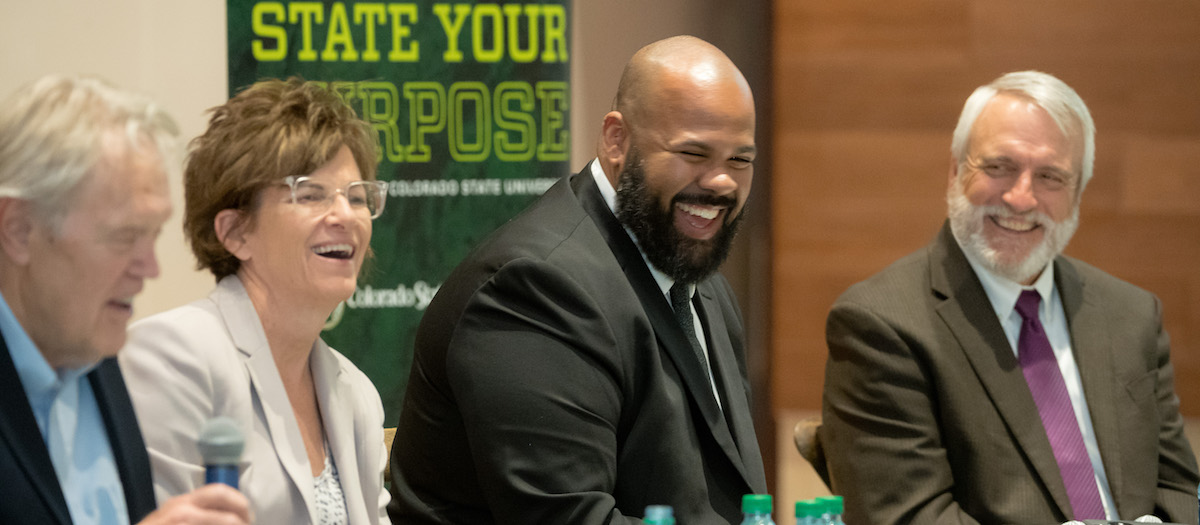How has the nation gotten so polarized, and what are some of the ways we can address that divisiveness?
These were a couple of the questions tackled by a panel of prominent guest speakers at the Sept. 28 kickoff of this year’s “Great Conversations” series hosted by the College of Liberal Arts.
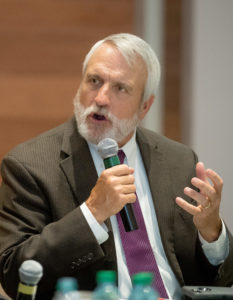
“Civic Engagement and Governance in a Polarized Society,” held at the Iris & Michael Smith Alumni Center, featured a panel of exceptional liberal arts alumni and faculty: former Colorado Gov. Bill Ritter (’79); former New York Times Public Editor Liz Spayd (’81); John Straayer, professor of political science; and Albert Bimper, associate professor of ethnic studies and senior associate athletic director for diversity, inclusion, and engagement in the Department of Athletics.
‘Heart of the university’
College of Liberal Arts Dean Ben Withers opened the event by noting that the Great Conversations program has become an important tradition of taking work done by the college’s talented faculty out to the community.
“It’s my personal belief that a college of liberal arts is really the heart of a land-grant university because of the things that we study and we teach,” he said. “Among other things, we advance the knowledge of history, culture and society, and we hone skills of personal creativity, communication and critical thinking that, as we know, are even more important in the world we are seeing today.”
Straayer began by describing a past period of polarization, the late 1960s and early 1970s, when the civil rights movement, opposition to the Vietnam War and other issues caused riots around the country. He noted that at CSU there were campus protests and even the burning of Old Main.
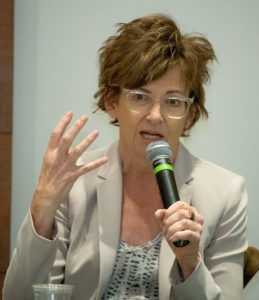
“So polarization is nothing new,” he said. “And that wasn’t the first time we were polarized.”
Partisanship at the top
Ritter said political divisions don’t seem to be as bad at local levels as they are at the national level.
“When you work in municipalities, there are often days in front of a city council or town council or even county commissioners when it’s pretty hard to understand who is a Republican and who is a Democrat,” he said. “So the lower that governance gets to the ground — if you think about the federal level, the state level and the local level — the more this thing dissipates, and that’s a positive.”
Spayd, who was recently hired by Facebook as a consultant to help build user trust, said the media has a share of responsibility for the divisiveness seen in the nation right now.
“I think that the media has helped separate half the country from their coverage, and that has helped contribute to the rise of places like Fox and Breitbart and a number of other sites,” she said. “They certainly do some good news coverage, but a lot of that coverage is not really based on facts.”
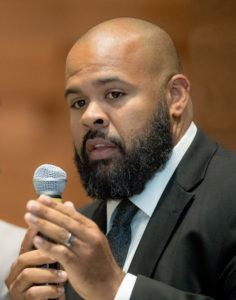
The Facebook effect
She acknowledged that while Facebook allows people to stay enclosed in a small circle of people like themselves, Facebook’s algorithms simply reflect what users have submitted and chosen to follow.
“A lot of what you see on Facebook is what you have built in there yourself,” she said.
Bimper explained that past racial injustices can prevent people with privilege from seeing what other groups’ lives are really like. He also addressed the controversy over former San Francisco 49ers quarterback Colin Kaepernick declining to stand during the national anthem last year.
“Kaepernick is, in my opinion, the most patriotic in these moments right now,” he said. “Kaepernick loves this country so much that he’s willing to criticize her perpetually. That’s a James Baldwin type of love for this country. Kaepernick very much knows what veterans and patriotism and nationalism and all of that mean, and it requires us to question.”
Trump’s presidency
Several speakers spoke about the effect that the presidency of Donald Trump has had on dividing the country.
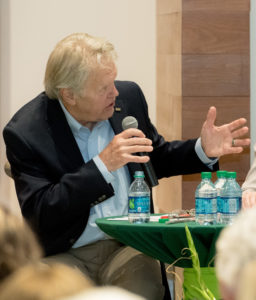
“I do think what Trump did, in resonating with people’s fears, was really to tap into those issues around class and cultural conflict,” Ritter said.
Straayer said that in the long term, efforts to reduce polarization have to be directed at children.
“We’ve got to start out with the young ones, all the way through K-12 and college and beyond,” he said. “Expose, expose, expose, to differences, differences, differences. Question, question, question. It’s systematic doubt. You need to wonder if you are seeing things the way other people see them.”
Several panel members agreed that ways to reduce polarization include understanding our level of privilege, leaving the “echo chamber” that social media can create, using the ballot box to create change and removing special-interest money from the political system.
Straayer emphasized the importance of education.
“The liberal arts — and I use that term broadly — that’s the best weapon we’ve got against more polarization,” he said.
About the series
Now entering its 22nd year, the Great Conversations program is a community of engaged learners who receive unique access to liberal arts faculty research, exploring the latest scholarship out of the College of Liberal Arts, and participating in lively discussion around topics of local, national, and global importance. For more information about Great Conversations and upcoming events, visit http://col.st/7VqXs.
